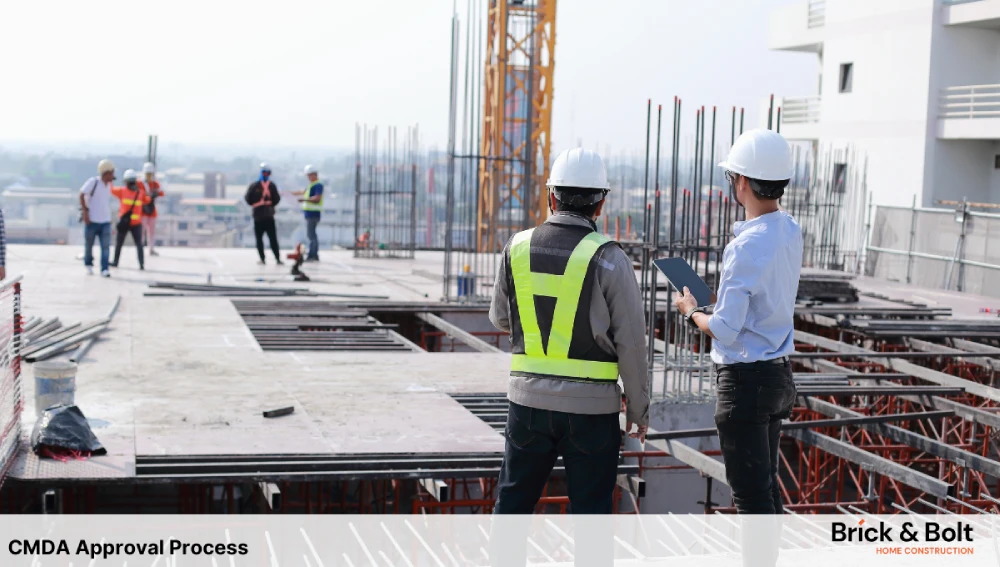Over the last two decades, Chennai city is witnessing tremendous growth in the real estate market. It causes demand for plots and residential properties for sale.
Before embarking on any construction project, it is crucial to obtain CMDA (Chennai Metropolitan Development Authority) approval. The CMDA acts as the regulatory body administering all the construction activities that take place within Chennai.
This article explains the CMDA approval in detail, making it easier for you to plan and obtain real estate projects and permits in Chennai.
What is CMDA?
The Chennai Metropolitan Development Authority was initiated to plan and develop the capital region of Tamil Nadu (Chennai). The CMDA was officially passed in 1972 to ensure the zoning regulations, environmental guidelines, and safety standards.
Under this regulation, the local authorities of the Chennai Metropolitan Area are empowered to provide planning permissions for real estate projects in several categories. These include institutional, residential, industrial, commercial, and other relevant subdivisions. Builders must strictly adhere to the CMDA Rules For Residential Building before undertaking any residential project.
What Does CMDA Approval Signify?
The CMDA-approved plot or property denotes that it has already been verified thoroughly for land titles. So, if you are about to purchase that plot or property, you are guaranteed that the land title is neat and free from any disputes.
Importance of CMDA Approval
CMDA approval is compulsory for all real estate projects in Chennai. It is the first and foremost step in property development plans to ensure that the particular property is verified under all legal regulations. Real estate agents, builders, buyers, developers, and promoters must acquire CMDA approval.
Benefits for Property Buyers
Opting for CMDA-approved properties or plots provides buyers with financial, legal, and infrastructural protection. It ensures clear land titles, provides security and credibility to the purchase, and safeguards investments.
Benefits for Developers and Builders
Getting plan approval and building permits is generally challenging for developers and builders. However, it can be easier with CMDA approval. Local authorities are more likely to issue the approval smoothly if the properties are situated in CMDA-sanctioned areas. Builders will not experience trouble or delays in construction projects.
When is CMDA Approval Required?
CMDA approval is mandatory before undertaking any development projects in the real estate sector. It confirms that the area is facilitated with proper roads, infrastructure, power supply, water supply, sewerage management systems, etc. The approval is valid for only three years from the date of issue.
CMDA Approval Process

Here are the lists of steps you need to take when applying for CMDA approval:
Site Inspection
As an initial step, CMDA officials will conduct an on-site assessment to ensure the property meets estimated zoning laws and regulations. They thoroughly verify the zone or area of projects located in different parameters.
Application Submission
After the site visit, the applicant must submit a formal application form for CMDA approval. It should contain all relevant information including specifications, intended property use, building design, cost of budget, etc.
Technical Review
Reviewing is a crucial part where the officials will look at the project’s technical facets to confirm that it aligns with estimated construction standards and regulations. They put extra effort into verifying the structural computations, building plans, and specifications.
Fee Payment
If the project is designed per the norms, the CMDA officials issue an approval letter. The applicant can obtain the final approval by paying the applicable charges mentioned.
Document Submission
Document submission is paramount to getting CMDA approval. The applicant must submit the documents, including the encumbrance certificate, the project’s layout plan, and the NOC (No Objection Certificate) from the local authorities.
Plan Approval
Once the required documents are submitted, the officials provide a plan approval letter. It includes detailed information such as clear specifications, sanctioned building design, and relevant information.
Building Permit
After obtaining the plan approval, the applicant needs to apply for a building permit with additional documentation, such as a fire safety plan, electrical layout, structural stability certificate, etc.
Final Inspection
Once the construction work has been completed, the CMDA officials will visit the site physically. This inspection ensures that you have followed all the rules and regulations as estimated.
CMDA Approved Layout
Potential buyers need to verify the status of a CMDA approval Layout to make informed decisions. It can be done by :
- Checking out the website or CMDA office to ensure the approval status of a layout
- Verifying the certificate issued by CMDA officials
- Consulting any experts to verify the property or plot in all aspects
Conclusion
Investing in CMDA-approved plots or properties safeguards your investment and ensures that it has clear titles and enhanced security and credibility. Any real estate projects without CMDA approval have many legal consequences in Chennai city.
Overall, the buyers, developers, or real estate agents for Residential buildings who adhere to regulations are free from risks and uncertainties.
FAQs
1. What is the Meaning of CMDA Approved?
CMDA acts as a regulatory body concerned about all construction activities in the Chennai Metropolitan City. It is applicable for Chennai and its surrounding suburbs.
2. What is the Purpose of CMDA?
CMDA is a statutory organization that was developed to regulate the physical development of Chennai. It is aligned with constructed standards and regulations. CMDA approval ensures that the property is completely safe with clear land titles.
3. What is the CMDA Limit?
CMDA organization handles town planning and development within the Chennai Metropolitan area. In 1974, the area was limited to 1,189 sq km; in 2022, it expanded to 5,904 sq km.
4. Are Patta and CMDA the Same?
No, both the parameters are different. Patta will apply only for the land, whereas CMDA approval is mandatory for the flat or house plan and land you intend to buy.

